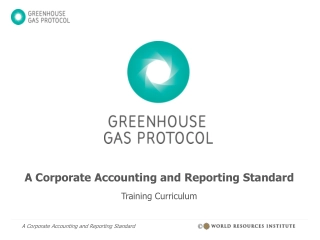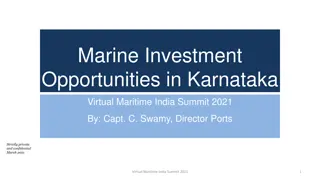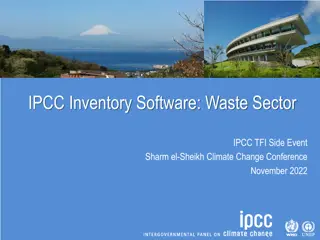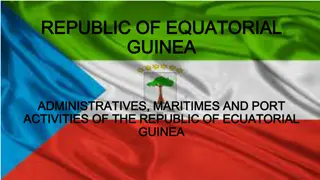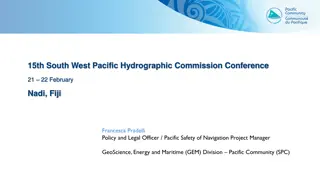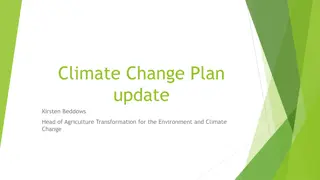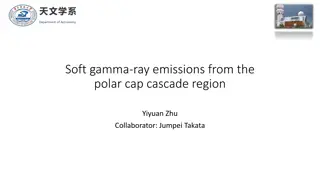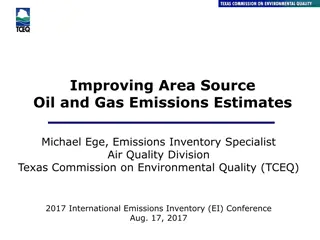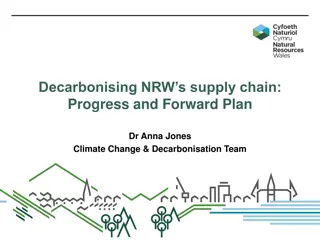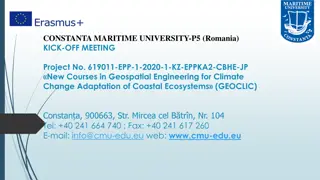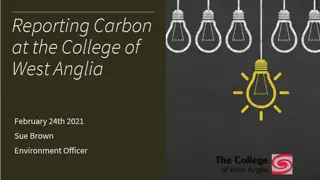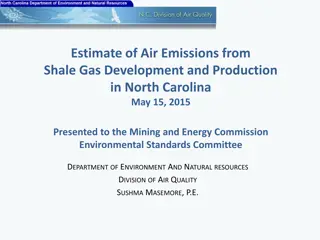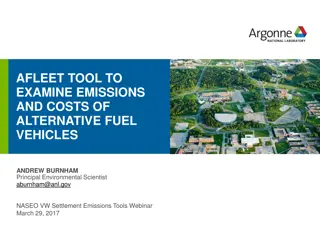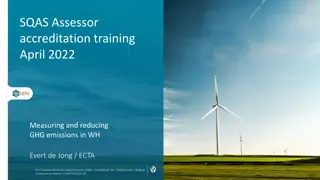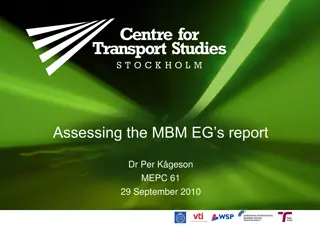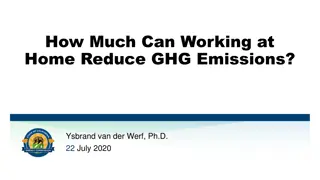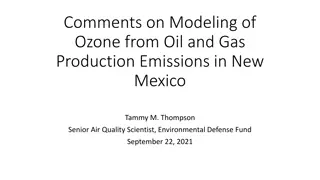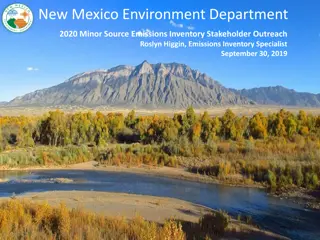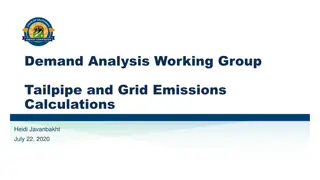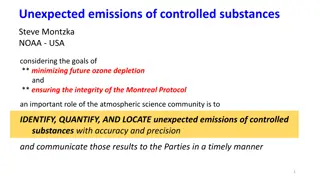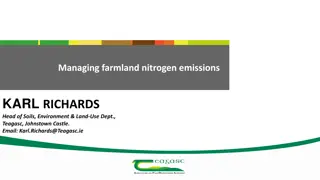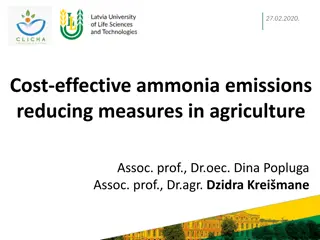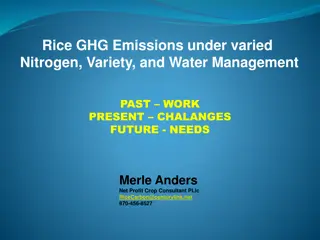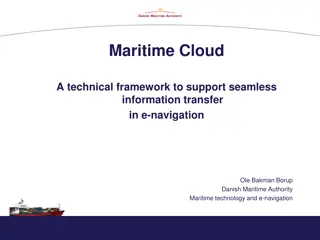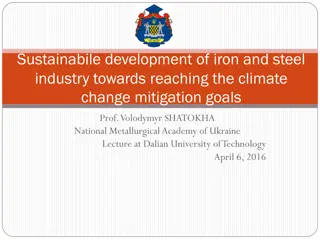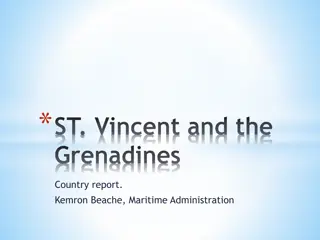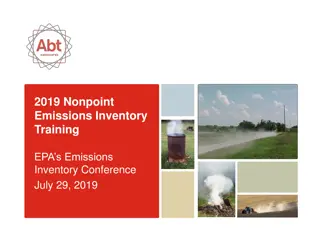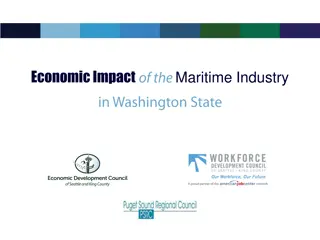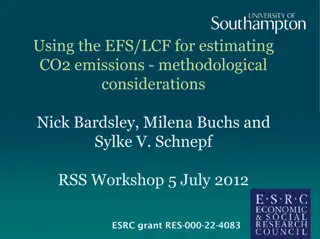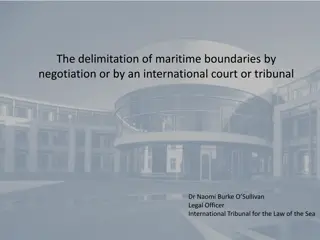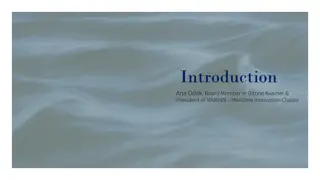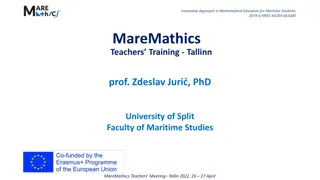European Maritime Single Window environment
Explore the European Maritime Single Window environment with key definitions, established platforms, and past regulations aiming to simplify and harmonize maritime reporting formalities in the EU. Understand port calls, declarants, reporting obligations, and the purpose behind this regulatory framew
5 views • 14 slides
A Corporate Accounting And Reporting Standard
Principles and guidelines for preparing GHG emissions inventories, focusing on organizational boundaries, operational boundaries, tracking emissions over time, calculating emissions, and reporting GHG emissions. It emphasizes relevance, completeness, consistency, transparency, and accuracy in accoun
1 views • 14 slides
A Corporate Accounting and Reporting Standard
This training curriculum covers principles of GHG accounting, organizational boundaries, setting operational boundaries, tracking emissions over time, calculating emissions, and reporting GHG emissions. It emphasizes the importance of determining which company operations and emissions sources to inc
2 views • 25 slides
Tradeoffs Between Water Savings and GHG Emissions in Irrigated Agriculture
This study examines the tradeoffs between water savings, economic impact, and greenhouse gas emissions resulting from technological changes in the irrigation industry. Key objectives include estimating water savings for different crops, quantifying GHG emissions from new irrigation technologies, and
0 views • 24 slides
Understanding Consumption-Based Emissions Inventories in Boulder County
Consumption-Based Emissions Inventories (CBEIs) play a crucial role in assessing greenhouse gas emissions linked to local consumption patterns. By calculating emissions associated with products and services used by a community, CBEIs reveal significant gaps in traditional emissions tracking, emphasi
2 views • 13 slides
BTH/OTH Radar and Maritime Surveillance Radar Overview
The article discusses BTH/OTH radar systems and maritime surveillance radars, exploring their functionalities, benefits, drawbacks, and real-world examples. It delves into the working principles of OTH radar, showcasing how it operates through the ionosphere. Additionally, it covers the concept of m
5 views • 12 slides
Professional Development and Maritime Education at US Naval Academy
The Division of Professional Development at the United States Naval Academy in Annapolis focuses on developing professional mariner skills to prepare Midshipmen for their roles as competent Naval officers. The program includes training in seamanship, navigation, summer sessions, fleet cruises, and a
2 views • 11 slides
Opportunities in Karnataka's Maritime Sector: Virtual Maritime India Summit 2021
Discover the marine investment opportunities in Karnataka highlighted at the Virtual Maritime India Summit 2021. With a well-developed industrial hinterland and picturesque coastal landscape, Karnataka offers multiple prospects in the maritime sector, including tourism development along its waterway
0 views • 10 slides
IPCC Inventory Software Enhancements for Waste Sector Emissions Estimation
Explore the latest enhancements in the IPCC inventory software related to waste sector emissions estimation. Major updates include subnational disaggregation, Tier 3 methods, wetlands supplement, and improvements in worksheet structure and layout. The software allows for detailed estimation of green
1 views • 10 slides
Maritime and Geographical Overview of Equatorial Guinea
Equatorial Guinea, a country in central Africa, boasts a significant maritime presence and strategic geographical location in the Gulf of Guinea. With a population of over 1.2 million, it shares borders with Cameroon and Gabon while having maritime boundaries extending 320 nautical miles. The countr
0 views • 15 slides
International Maritime Organization (IMO) and IMSAS: Ensuring Compliance with Maritime Standards
The International Maritime Organization (IMO) plays a crucial role in promoting maritime safety, protecting the marine environment, enhancing maritime security, and ensuring the human element in shipping. Through the Instrument Implementation Code (III Code) and the Voluntary IMO Member State Audit
0 views • 21 slides
Transforming Agriculture for Climate Change: Kirsten Beddows' Vision
Kirsten Beddows, Head of Agriculture Transformation, shares an updated Climate Change Plan focused on reducing emissions, achieving net-zero by 2045, and creating sustainable farming practices. The plan includes over a hundred new policies targeting emissions reduction, land use optimization, and ca
0 views • 9 slides
Understanding Soft Gamma-Ray Emissions from Pulsar Polar Caps
Soft gamma-ray emissions from the polar cap cascade region are a subject of interest in astrophysics, with studies focusing on the fundamental physical processes of pulsars and potential origins of non-thermal X-ray emissions. Researchers explore the emission processes, polar cap accelerators, casca
0 views • 16 slides
Emissions Reductions Beyond the Clean Smokestacks Act (CSA) Overview
Emissions Reductions Beyond the Clean Smokestacks Act (CSA) is a comprehensive program aimed at improving air quality by imposing limits on pollutant emissions from coal-burning facilities. The act has successfully achieved significant reductions in nitrogen oxide (NOx) and sulfur dioxide (SO2) emis
1 views • 12 slides
Enhancing Oil and Gas Emissions Estimates for Area Sources
This presentation by Michael Ege, an Emissions Inventory Specialist at the Texas Commission on Environmental Quality (TCEQ), focuses on improving area source oil and gas emissions estimates. It covers the methods used to estimate emissions, including the development of basin-specific equipment profi
0 views • 31 slides
Decarbonising NRW's Supply Chain Emissions: Progress and Challenges
Dr. Anna Jones and her team are spearheading efforts in Wales to achieve net zero emissions by 2050, with a focus on decarbonising NRW's supply chain and the public sector. The Welsh public sector aims to collectively reach net zero by 2030, with a strong emphasis on reporting and reducing emissions
0 views • 10 slides
Constanta Maritime University - Empowering Maritime Education
Constanta Maritime University in Romania, established in 1972, is a prestigious public institution offering a diverse range of accredited study programs in maritime and engineering fields. With a focus on quality assurance and international recognition, the university remains a leading choice for st
2 views • 10 slides
Corporate Energy Disclosure Requirements and Methodology
Corporations making energy disclosures on a college website by March 31st, 2021, must include annual UK energy use data, greenhouse gas emissions, methodology used, energy efficiency measures, and emissions intensity ratios. The disclosure covers Scope 1, 2, and 3 emissions, business travel, and met
0 views • 23 slides
Overview of Air Emissions and Quality Assessment in Shale Gas Development
The presentation discusses the estimation of air emissions from shale gas development and production in North Carolina, highlighting the importance of analyzing emissions from oil and gas activities and associated truck traffic. The process involves building emissions inventory, photochemical modeli
0 views • 22 slides
AFLEET Tool for Examining Emissions and Costs of Alternative Fuel Vehicles
AFLEET is a tool developed by Argonne National Laboratory to analyze the emissions and costs of alternative fuel vehicles. It provides insights into the benefits of using different fuel technologies and helps in decision-making for vehicle fleet management. The tool includes calculations for emissio
0 views • 25 slides
Greenhouse Gas Emissions Management in Warehouse Operations
The SQAS Assessor accreditation training in April 2022 focused on measuring and reducing greenhouse gas emissions in warehouse operations. The content covers emission questions, scope of emissions, energy consumption examples, disaggregation of emissions, emission intensity calculation, and strategi
0 views • 17 slides
Maritime Emissions Reduction Strategies and Policy Instruments Overview
Assessment of the Expert Groups' reports on maritime emissions reduction strategies, emphasizing the need for multiple policy instruments targeting new ships, existing ships, and operational aspects. Discusses the negative side effects of flexible policies and the importance of imposing requirements
1 views • 23 slides
Potential Reduction of GHG Emissions by Working at Home
This analysis explores the impact of increased remote work on reducing greenhouse gas emissions, particularly in the context of the COVID-19 lockdown. By examining workforce data, commuting patterns, and emission statistics in California, the study aims to quantify the potential decrease in GHG emis
0 views • 15 slides
Modeling the Impact of Oil and Gas Emissions on Ozone in New Mexico
Tammy M. Thompson, a Senior Air Quality Scientist at the Environmental Defense Fund, discusses the modeling of ozone from oil and gas production emissions in New Mexico. The analysis focuses on areas with high ozone concentrations and their overlap with oil and gas regions, highlighting the sensitiv
0 views • 8 slides
Understanding Emissions Inventory for Air Quality Management
Emissions inventory plays a crucial role in monitoring air pollutant discharges and assessing air quality. This article discusses the purpose of emissions inventory, distinguishing between actual and permitted emissions, and provides guidelines for preparing and reporting minor source emissions inve
0 views • 15 slides
Demand Analysis Working Group: Tailpipe and Grid Emissions Calculations Overview
This report discusses the methodology for calculating tailpipe emissions using vehicle stock and VMT data, along with grid emissions from charging PEVs. Challenges include differences in vehicle classifications and lack of trip forecast calculations. Mapping LDVs from CEC classes to EMFAC classes wa
0 views • 10 slides
Monitoring Unexpected Emissions of Controlled Substances for Ozone Protection
The atmospheric science community plays a crucial role in identifying, quantifying, and communicating unexpected emissions of controlled substances to support the goals of minimizing future ozone depletion and upholding the Montreal Protocol. By comparing observation-based estimates of global emissi
0 views • 13 slides
Managing Farmland Nitrogen Emissions: Strategies and Research Updates
Soils play a crucial role in greenhouse gas emissions and carbon sequestration. Karl Richards, Head of Soils, Environment & Land-Use Department at Teagasc, discusses the importance of managing farmland nitrogen emissions through various practices. Research focuses on reducing emissions and enhancing
0 views • 8 slides
Cost-effective Measures to Reduce Ammonia Emissions in Agriculture
Cost-effective strategies to reduce ammonia emissions in agriculture are crucial in Latvia, where a significant portion of emissions originate from the agricultural sector. The study focuses on potential measures, such as precise mineral fertilizer application, improved manure management, nitrogen f
0 views • 13 slides
Rice GHG Emissions under Varied Nitrogen, Variety, and Water Management Study in Arkansas
Detailed study on rice greenhouse gas emissions under varied nitrogen, variety, and water management treatments, focusing on nitrogen fertility, crop varieties, and water usage impact on methane and nitrous oxide emissions. Research examines optimal nitrogen rates for reduced global warming potentia
1 views • 18 slides
Maritime Cloud: Supporting Seamless Information Transfer in E-Navigation
The Maritime Cloud is a technical framework designed to facilitate seamless data exchange in e-navigation, connecting maritime actors onboard and ashore. It addresses identified framework requirements and guiding principles for secure communication and efficient service provision in the maritime ind
0 views • 19 slides
Sustainable Development of Iron and Steel Industry for Climate Change Mitigation
The lecture by Prof. Volodymyr SHATOKHA discusses sustainable development in the iron and steel industry to meet climate change mitigation goals. It examines current global climate targets, the role of the industry in greenhouse gas emissions, and the feasibility of reducing emissions. The study foc
0 views • 27 slides
Maritime Initiatives in St. Vincent and the Grenadines
The report outlines various maritime initiatives in St. Vincent and the Grenadines, including the Commonwealth Marine Economies Program, technical missions from IALA, goals for maritime spatial planning and development, and efforts towards ocean governance. Challenges and areas for improvement in ma
1 views • 5 slides
Understanding the Nonpoint Emissions Inventory Training Conference
The Nonpoint Emissions Inventory Training Conference held by the EPA provided valuable insights into nonpoint sources of emissions. Sessions covered topics such as NEI definition, previous processes, and developments in the 2017 NEI process. Tools like NEMOs and the Wagon Wheel were introduced to im
0 views • 53 slides
Economic Impact of Washington's Maritime Industry
Washington State's maritime industry, rooted in a rich history of timber production and trade hub location, encompasses core sectors like passenger water transportation, shipbuilding, fishing, and more. With an annual economic impact of $15.2B, the industry thrives through innovation, research, and
0 views • 9 slides
Methodological Considerations in Estimating CO2 Emissions Using EFS/LCF
Various studies have utilized the EFS/LCF in the UK to estimate household emissions and policy impacts. This involves converting expenditures into emissions, which presents methodological challenges such as infrequent purchases and variations in data sources. The comparison of household CO2 emission
0 views • 17 slides
Delimitation of Maritime Boundaries by Negotiation or International Courts
Delimitation of maritime boundaries can be achieved through negotiation or by international courts or tribunals. Maritime boundary agreements have legal effects and obligations for the involved states. International bodies like the International Court of Justice and the International Tribunal for th
0 views • 5 slides
MARINN Maritime Innovation Cluster - Driving Skills Development in the Maritime Industry
MARINN Maritime Innovation Cluster, founded by GITONE Kvarner, is focused on developing skills in the maritime industry amidst a digital and green revolution. Through collaboration, education, and innovation, MARINN aims to enhance operations, promote sustainability, and empower professionals for th
0 views • 6 slides
Celebrate National Careers Week with Maritime Careers Ambassadors!
National Careers Week from 6th-12th March features a Maritime-focused day on 8th March. Ambassadors are invited to share their experiences in a case study template by including a photo, a quote on Maritime careers, their name, role, and UK region. The completed templates can be posted on social medi
0 views • 4 slides
Innovative Approach in Mathematical Education for Maritime Students
Explore the innovative approach in mathematical education for maritime students as presented during the MareMathics Teachers Training and Meeting in Tallinn. The sessions covered topics such as mathematical applications in thermodynamics, including partial derivatives, derivations, and integrals wit
0 views • 11 slides


